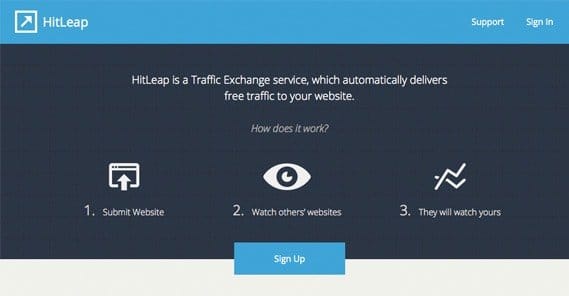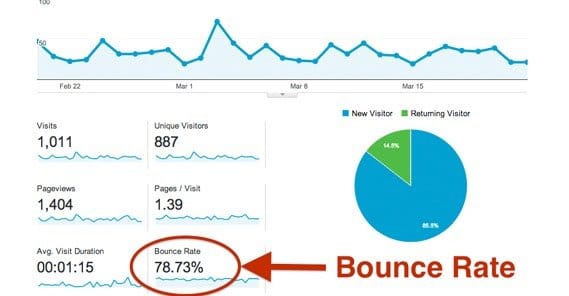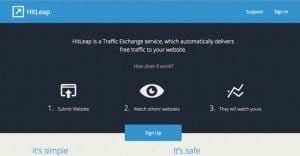How Does Traffic Trading Work and is It Worth It?

Traffic trading is a simple concept with a complex execution. The idea is simple; I send you one visitor, you send me one visitor. We effectively combine our audiences, on a 1:1 level, until we no longer have visitors to exchange. If you have more traffic than I do, well, I need to get more visitors to send to you if I want a crack at them.
There are two ways to handle traffic trading; individually, or through an exchange. Traffic exchange networks are centralized sites where webmasters submit their sites and their traffic. By sending traffic into the exchange, the webmaster earns credits. They can then spend those credits on redeeming traffic to their site.
Some traffic exchanges operate on a 1:1 ratio as well, but most require that you send in more visitors than you get out.
This allows the exchange to feed in some of their own sites and ads, to make money to support themselves. They also often allow you to buy credits rather than earn them, though this is limited so there are always visitors in the exchange to get out of it.
Traffic trading on an individual basis is simpler to manage but potentially harder to enforce. It becomes a one on one deal between you and another site. Both sides implement a script for traffic trading, and then implement some way of referring traffic from one site to another. You might use links in blog posts, or pop-up ads, or pop-unders, or sidebar ads. It’s quite up to you.
The traffic trader script monitors the traffic you send out and records the visitors going to another site with the script implemented. It notifies that site, and that site makes sure to send visitors back.
As you can guess, this gets messy. It can easily be tripped up by bots and count those bots as legitimate referrals. If you send traffic in a way the script can’t monitor, the other site has no obligation to send traffic back. Recording is tricky. Plus, there’s no regulation on the quality of the traffic. This is why the exchanges exist in the first place; they’re a third party regulating the quality of the sites and the traffic in the network.
Flaw #1: Traffic Quality
There are a few major flaws with traffic exchanges and traffic trading. The first and perhaps most important flaw is the unregulated traffic quality.
On a one to one trading basis, it’s hard to keep track of the quality of the traffic you receive. You might be getting bots, you might be getting legitimate customers, or you might be getting a mix of the two. No one will recommend one to one trading for that reason.
For exchanges, however, you have a similar problem. Because everything runs on a credit system, webmasters will try whatever they can in order to “earn” themselves credits without actually earning them. This tends to include auto-viewers and bot traffic. More than one exchange has shut down after a lucrative launch because the quality of their traffic dropped to nothing.
The primary vulnerability of a traffic exchange is someone funneling bad, low quality or bot traffic into the system to earn credits. If enough people do this, sure, there’s plenty of traffic circulating through the system, but what use is it? Anyone who tries to cash out may think they’re gaming the system, but the traffic they get is the same bad traffic they put in, just coming from another source. Garbage in, garbage out. At that point, they might as well just buy a traffic bot and point it at their own sites, for all the good it does.
Flaw #2: Perceived Legitimacy
Another problem with traffic trading is legitimacy. For nearly a decade now, traffic trading and traffic exchanges have largely been the tools of a black hat webspammer. Any exchange that has legitimate traffic has spammers looking to feed bad traffic in and get good traffic out.
As such, simply by using a traffic exchange, you put yourself in the same group as these spammers. Even if your sites are great and the traffic you send is excellent, you’re still running with the wrong crowd. There’s an issue with perception, here, and you’re shooting your reputation in the foot if you’re called out. People start to wonder; if they’re using one bad technique, are they using others as well?
Flaw #3: Common Industries
Speaking of running with the wrong crowds, that’s another issue traffic exchanges have. The people most likely to run in a traffic exchange are gambling sites and adult sites. This has two problems.
First, it puts you in with the wrong crowd. Getting a lot of links and traffic from a gambling site is going to demolish your SEO, among other things. People who frequent those sites will wonder why your site is there being advertised.
The second issue is again a matter of traffic quality. The people who click links from an adult site are probably not the people you want visiting your site, unless you’re also an adult site. Sure, those people may be legitimate viewers, but they’re coming directly from the seedy underworld. At least make them go take a shower first, digitally speaking.
Is It Worth It?
All of that said, traffic exchanges can be worth it. I know I’ve hated on them a lot here, but there are valid uses.
- Sites within the niches targeted by traffic exchanges – gambling an adult sites, among others – can find some great traffic on them. There’s nothing wrong with being a legitimate webmaster running an adult site, as long as it’s all legal and moral.
- Some rare traffic exchanges have strict rules on the traffic you feed into the system. This makes them very exclusive, but it also makes them very valuable. If you can find such a legitimate exchange, you can get great traffic out of the deal.
- Visitors from traffic exchanges don’t stick around for long. You need to send the incoming traffic to dedicated landing pages to successfully convert them; your homepage or a plain blog post just won’t work.
Oh, and one quick note; AdSense and most other ad programs disallow traffic exchanges. Google knows the reputation and quality of the traffic you get from them, and so they keep an eye out to make sure you aren’t trying to game their system with an exchange.

 ContentPowered.com
ContentPowered.com







